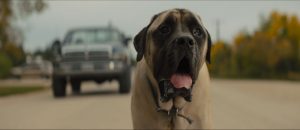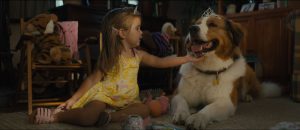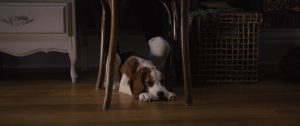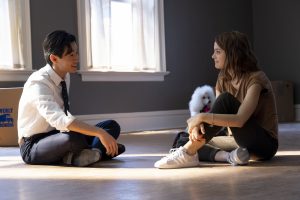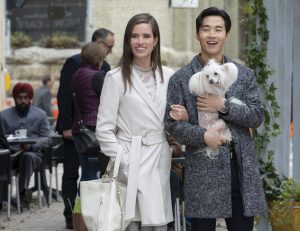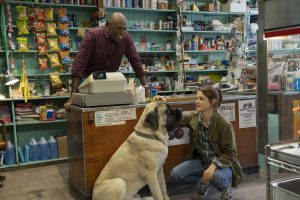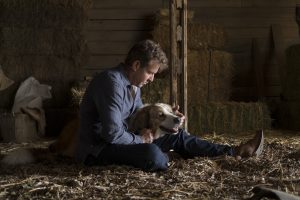April 3, 2020
by Carla Hay

Directed by Michael Dowse
Culture Representation: Taking place in Detroit, the slapstick action comedy “Coffee & Kareem” has a racially diverse cast that includes representation of white people, African Americans and Asians in the middle class or criminal underworld.
Culture Clash: A white cop, who’s dating an African American single mother, has a hard time being accepted by her 12-year-old son, and somehow they all end up in a dangerous battle against drug-dealing, murderous gangsters.
Culture Audience: “Coffee & Kareem” will appeal mostly to people who like comedy to be as offensive and dumb as possible.
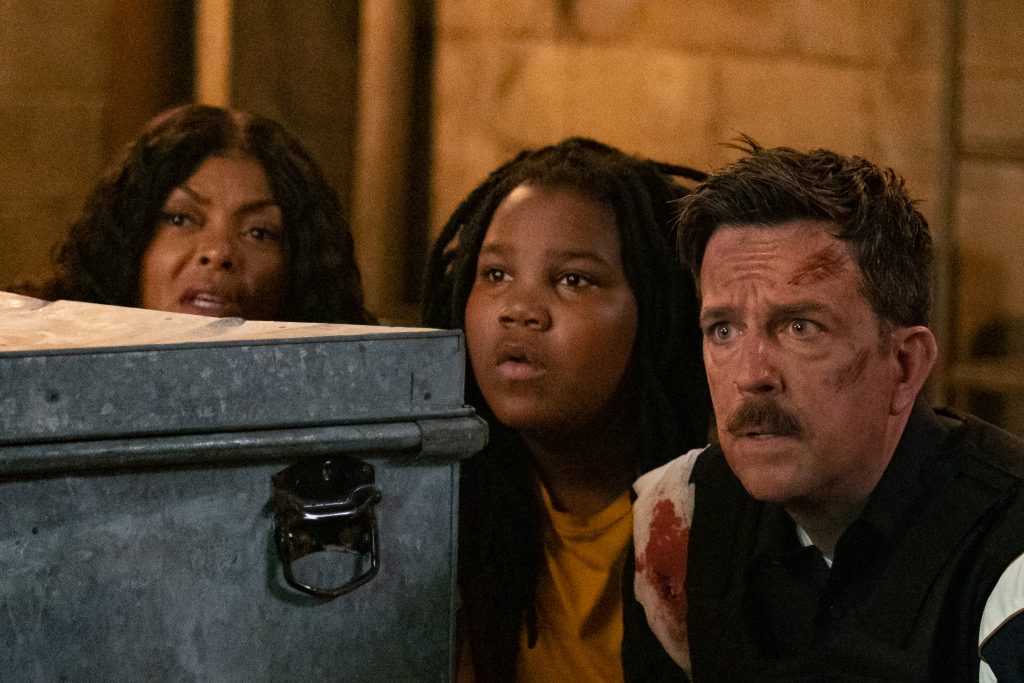
Before anyone is subjected to the toxic dump that is “Coffee & Kareem,” there should be plenty of warnings about how this loathsome movie has a perverted fixation on boys being sexualized. Every 10 minutes in this so-called “comedy,” there’s a joke about men having sex with boys, or the movie’s 12-year-old boy shouts to men, “Suck my dick!,” and other sexual commands that are much more explicit.
There is nothing new about films with underage actors saying very adult things in the name of comedy. (Two examples are 2010’s “Kick-Ass” and 2019’s “Good Boys.”) But those other movies about kids saying adult things weren’t about the constant repetition of pedophilia jokes. “Coffee & Kareem” takes this gimmick to such depraved and unfunny levels that it says a lot about the disgusting mindsets of screenwriter Shane Mack and director Michael Dowse and how creatively bankrupt they are to use pedophilia as a running joke in this trashy movie.
“Coffee & Kareem” is also filled with a lot of racist stereotypes and homophobic comments that are also supposed to pass as “jokes.” It’s a shame that Taraji P. Henson, who is capable of doing Oscar-caliber work and who talks a lot about empowering African Americans, seems to be flushing her career down the toilet by doing this pathetic, degrading excuse of a movie. “Coffee & Kareem” is an insult not just to African Americans but also to anyone who wants raunchy comedies to actually be funny. Whatever she got paid for making this garbage movie isn’t worth the credibility that she’s lost by attaching herself to this racist crap.
It should come as no surprise that there isn’t much of a plot to “Coffee & Kareem,” which seems to exist for the purpose of making a black boy look as ghetto, ignorant and nasty as possible. Terrence Little Gardenhigh is the foul-mouthed 12-year-old brat Kareem Manning, the son of single mother Vanessa Manning (played by Henson), who is under the delusion that Kareem is a lovable and nice kid.
They live in Detroit, where Vanessa is dating an awkward and nerdy cop named Jim Coffee (played by Ed Helms, in yet another of his long list of awkward and nerdy character roles). Not surprisingly, Kareem doesn’t approve of the relationship. In the beginning of the movie, after Kareem is dropped off at school, Coffee stops by Vanessa’s house so they can have a romantic tryst.
But, of course, since this movie is obsessed with sexualizing Kareem, he’s come back home to retrieve his phone, and he sees his mother and Coffee having sex. It’s an excuse for the filmmakers to make Kareem say angrily about Coffee having sex with Vanessa: “That fucking pig stuck his dick in the wrong blanket.” And that’s one of the tamer things that Kareem says in the movie.
Kareem is a wannabe rapper (how unoriginal) who, as it’s shown soon enough in the movie, is quick to accuse any male adult of trying to sexually molest him if they dare to try to discipline him when he’s breaking rules. Coffee is no exception to these hateful threats from Kareem. It’s a “joke” that gets old very quickly and it’s over-used to the point where you have to wonder why these filmmakers are so fixated on men performing sex acts on boys, because it’s mentioned so many times in this movie. Helms gets some of the blame here too, since he’s one of the film’s producers.
Coffee is not just disrespected by Kareem, but he also has problems getting respect in his workplace. One of Coffee’s fellow cops—an ambitious and aggressive detective named Watts (played by Betty Gilpin)—frequently ridicules him. Watts thinks that Coffee is a wimp, and she doesn’t hesitate to humiliate him in front of their co-workers, including taunting Coffee over the fact that his ex-wife cheated on him with numerous men and eventually left him.
Watts’ constant insults about Coffee’s sex life and manhood reach a point where Coffee has filed a sexual-harassment complaint against her, but their supervisor Captain Hill (played by David Alan Grier) doesn’t take the complaint seriously and dismisses it. The captain also doesn’t want to reprimand Watts, who is a star on the police force, since she’s led a recent high-profile drug bust that confiscated almost one ton of cocaine. The drug dealer responsible for this drug inventory is named Orlando Johnson (played by RonReaco Lee), and he was arrested as part of the drug bust.
But to add to Coffee’s further humiliation, while Orlando was being transported in the back of Coffee’s squad car, Orlando escaped and stole the car. And it was all caught on surveillance video, so the escape is shown on the news. (Apparently, the Detroit Police Department doesn’t want Coffee to have a cop partner, since he’s never seen with a partner.) Because of this major blunder of letting Orlando escape, Coffee gets all the blame and is demoted to traffic duty.
Meanwhile, even though he’s only 12 years old, Kareem has a plan to get a local gangster to “scare off” Coffee, so that Coffee will stop dating Kareem’s mother. And wouldn’t you know, out of all the criminals he wants to recruit to do this dirty deed, it’s Orlando. This movie is so dumb that it wants viewers to believe that even though Kareem doesn’t know Orlando, he can somehow find him in the big city of Detroit and pay piggy-bank-level money (literally a bag of coins) to do something bad to Coffee.
One day, Coffee picks Kareem up from school, and Kareem asks Coffee for a ride to a seedy part of town. Kareem goes to a boxing gym (which is really Orlando’s gangster hideout) with his bag of coins to pay Orlando to rough up Coffee. On the way to this destination, Coffee shows Kareem his police baton as a way to try to impress Kareem and perhaps form a friendly bond with him.
Kareem asks about the baton, “Ever wonder how far you can get that down your throat?” Coffee replies, “That’s not what it’s for.” Kareem responds, “Because it tastes like the ass of an innocent black man?” That’s what passes for humor in this movie. And that’s one of the least rude and crude things that Kareem says in “Coffee & Kareem.”
Before Kareem goes into the boxing-gym room to do the deal, he begins video recording on his phone so that he can upload it later on social media. When he gets in the room, Kareem sees Orlando with two of his thug cohorts—wannabe intellectual Rodney (played by Andrew Bachelor) and trigger-happy dimwit Dee (played by William “Big Sleeps” Stewart). They’ve tied up and tortured one of Coffee’s fellow police officers, Steve Choi (played by Terry Chen), for reasons that are revealed in the movie. (Not that anyone with a brain will care by then.)
Some chaos ensues, and Choi is shot and killed by Dee. Hearing the commotion, Coffee enters the room and tries to arrest the three criminals. It’s easy to predict how badly this goes. There’s a shootout, and soon Coffee and Kareem are running for their lives. But before they race off, Kareem accidentally drops his phone, which recorded the murder. And, of course, Orlando finds the phone and uses it to find out Kareem’s identity and where he lives.
Coffee becomes a wanted man by police because he unrealistically gets accused of murdering Choi. Coffee is also falsely accused of kidnapping of Kareem. Coffee’s fugitive status is all over the news media. And so, not only are Coffee and Kareem try to hide from the gangsters, they’re also on the run from the police. They go to Vanessa’s house to tell her what’s going on, and she too gets involved in this ridiculous mess.
“Coffee & Kareem” then devolves further into over-the-top shootouts, car chases, kidnappings and Kareem’s never-ending fixation on men performing sex acts on him. There’s a final insipid showdown involving massive explosions where one of the main characters is able to unrealistically walk out of a building that was completely destroyed by an explosion. Perhaps the only thing that can be described as entertaining in “Coffee & Kareem” is Gilpin’s totally unhinged performance (which is the best thing about this very bad film), but it’s not enough to overcome all of the stupid filth that’s in this movie.
Henson and Helms should get no praise at all for their acting in this film, since they’re just rehashing the same types of characters that they’ve played in pretty much every comedy that they do. Henson always plays someone quick-tempered and “sassy,” while Helms always plays a dork who gets caught up in situations that are way over his head. As for Gardenhigh, who plays the completely obnoxious Kareem, “Coffee & Kareem” is his first feature film. And based on the horrible impression that he leaves, it’ll probably be a while before he gets another starring role in a major feature-length movie.
“Coffee & Kareem” is so repulsive that everyone involved in making this trash should be ashamed to be associated with it. If “Coffee & Kareem” were available to buy or rent as a separate movie, instead of being a movie that’s exclusive to Netflix, then there would be and should be a whole lot of people demanding refunds.
Netflix premiered “Coffee and Kareem” on April 3, 2020.







